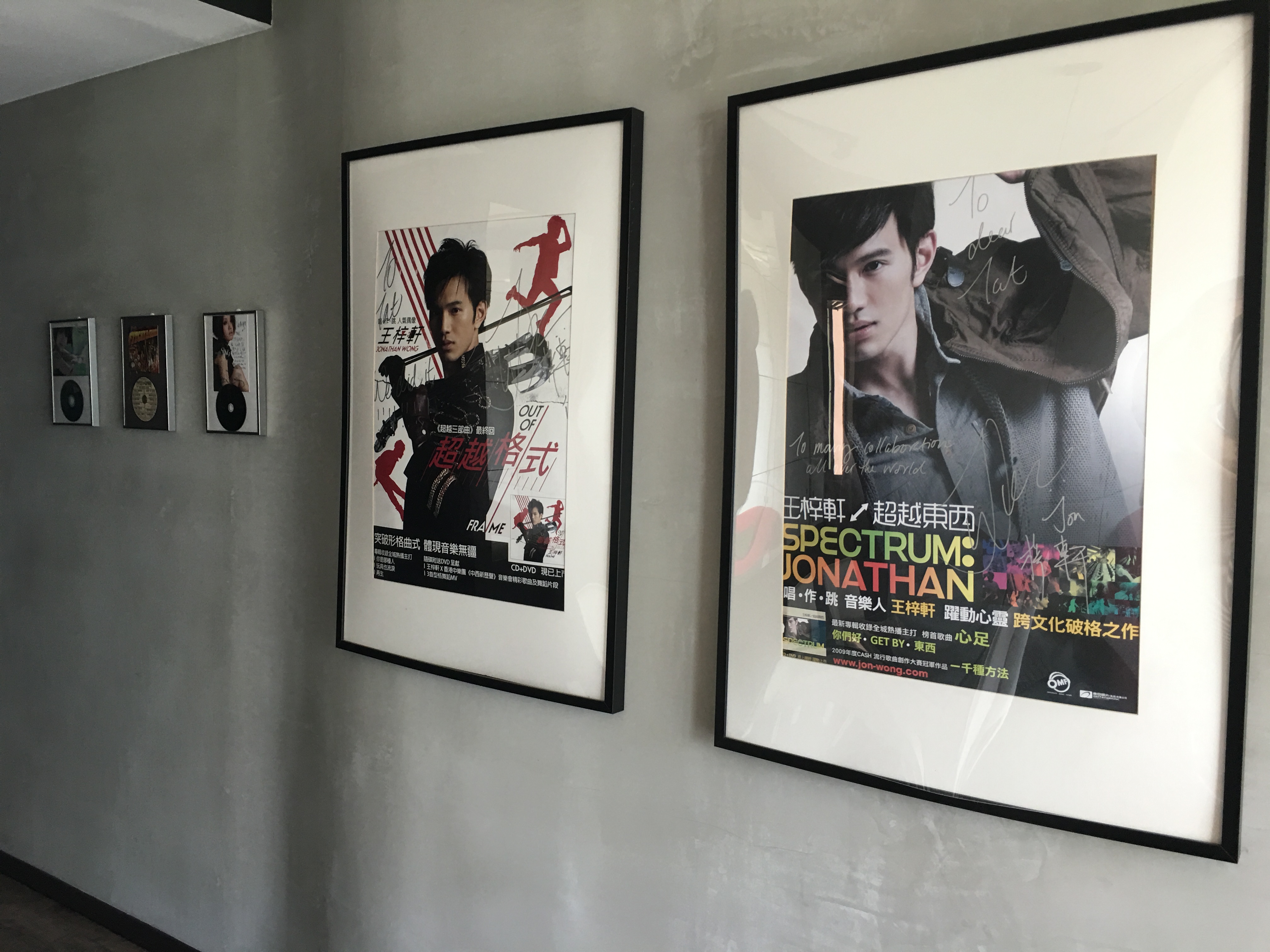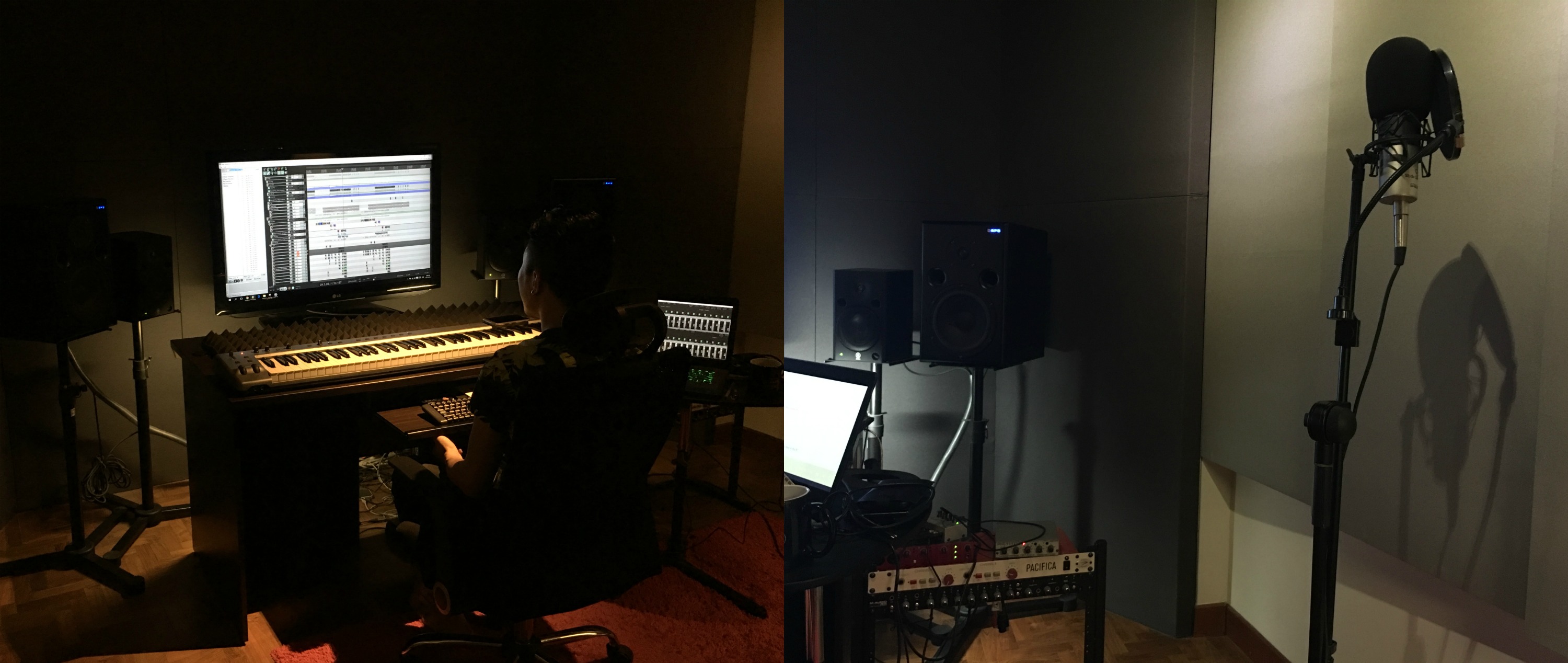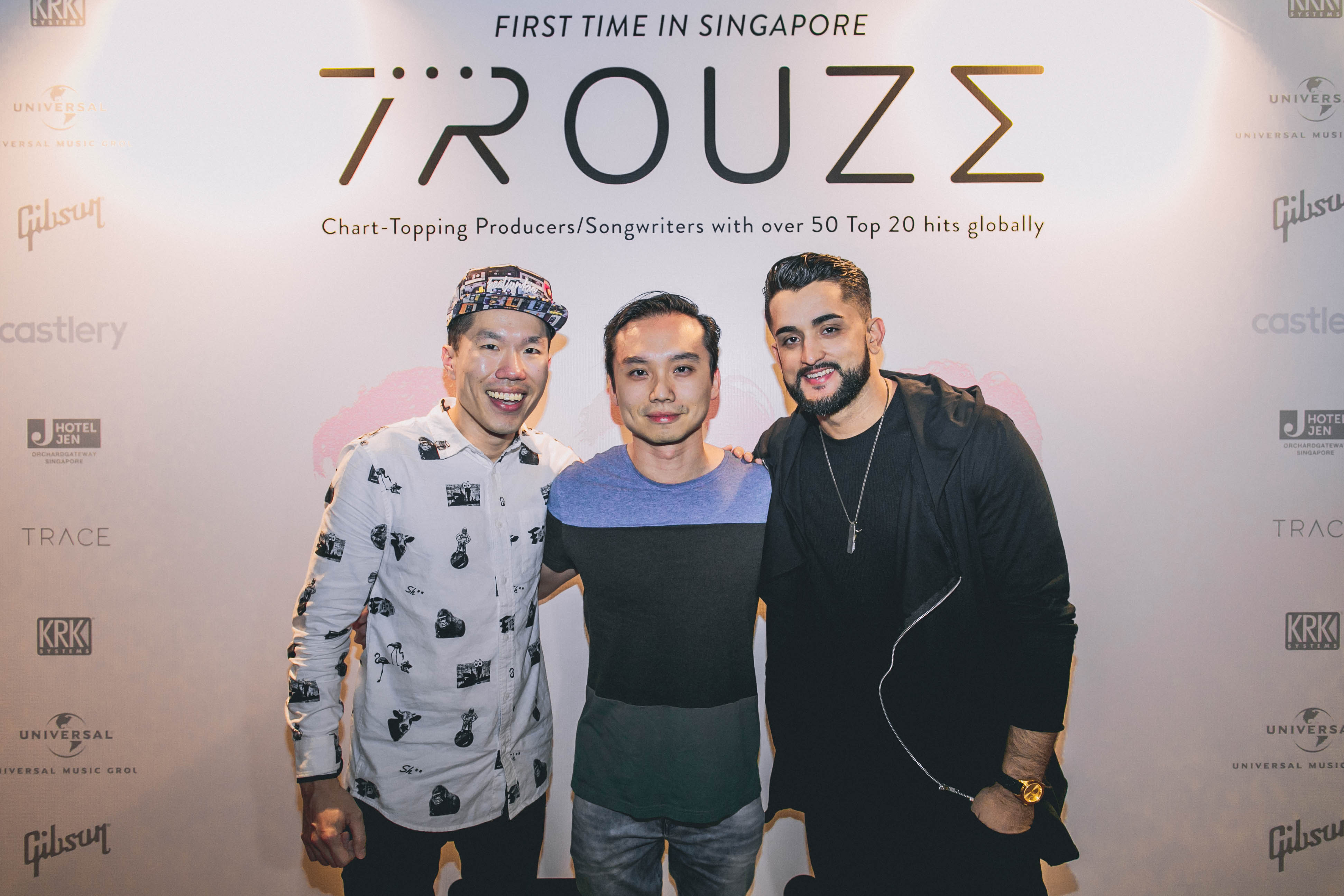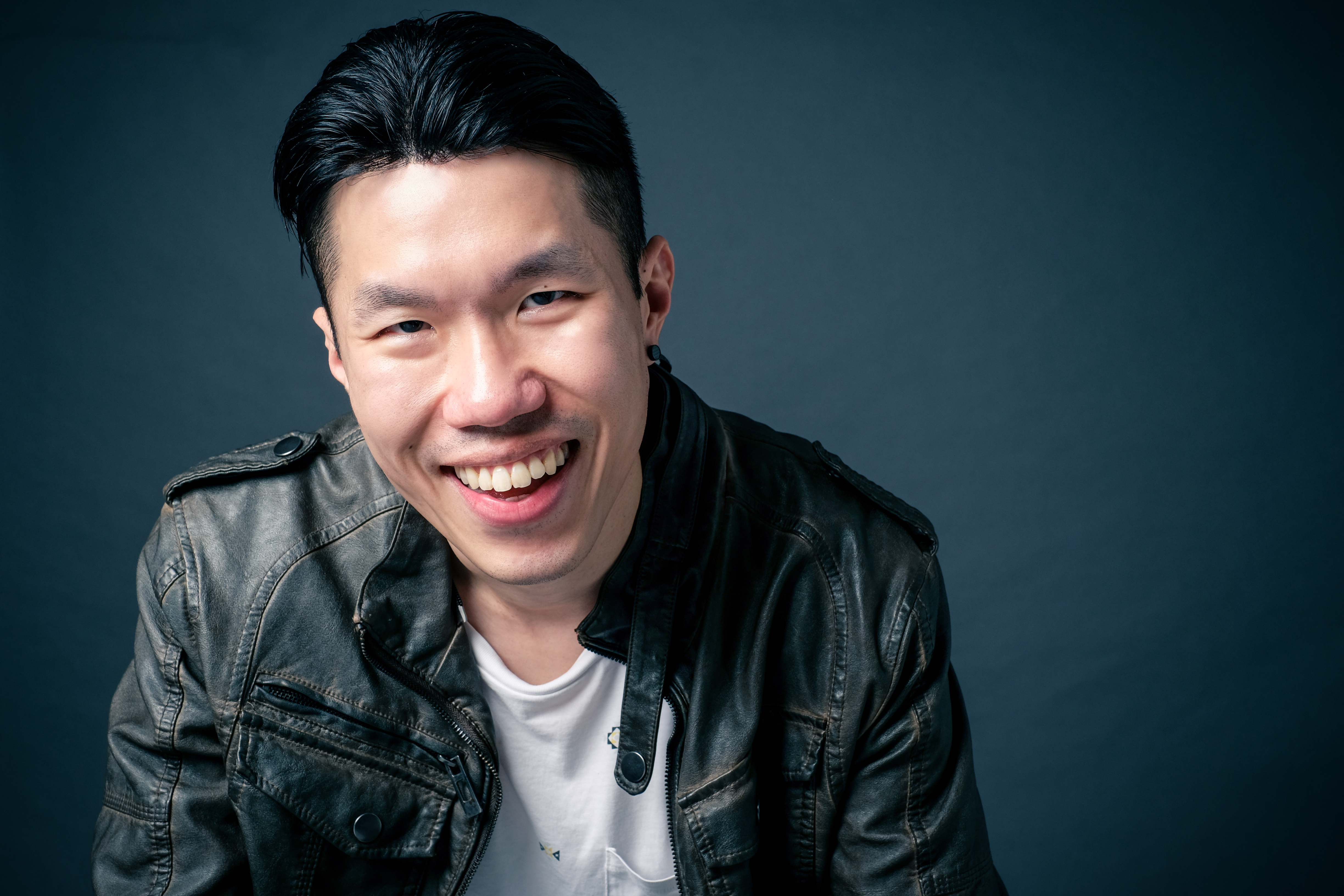“Almost Famous” is a new feature interview series on Mothership.sg. Starting this July, we bring you in-depth stories of people who could be more famous, with a new interview released every fortnight.
If you don't immediately recognise the name Tat Tong, we won't blame you.
But you might know his work — like
this:
" width="560" height="315" frameborder="0" allowfullscreen="allowfullscreen">
or this:
" width="560" height="315" frameborder="0" allowfullscreen="allowfullscreen">
He is someone you *should* know, because he's been blazing one heck of a trail for Singapore in the international music scene -- first in Mando- and Canto-pop, then in the U.S..
Currently, he, and his up-and-coming electronic dance music (EDM) group, is casting his eye on Latin America.
We first met 33-year-old Tong earlier this year, in a cozy Lorong Chuan apartment, where his walls are lined with frames of autographed posters and limited-edition DVDs from the likes of Tay Kewei, Jonathan Wong and Derrick Hoh.
 Photo by Jeanette Tan
Photo by Jeanette Tan
He welcomed us into his world: a bedroom converted into a studio with soundproof padded walls and ceilings, a carpeted floor and a state-of-the-art recording and sound system, adding up to a cool $20,000 in design and renovation costs.
"I think it comes to a point where I just needed my own spot to work at odd hours; I didn't want to inconvenience my parents either", he said.
 Photos by Jeanette Tan
Photos by Jeanette Tan
In Los Angeles (where he is based half of his time), he collaborates with songwriters, producers, working with the likes of the late Christina Grimmie, Troye Sivan (Tong was only responsible for "Happy Little Pill", his breakout hit, by the way, as well as his third EP "TRXYE"), and most often with American Idol Season 10 finalist Jovany Javier Barreto.
Most recently, Tong, alongside Barreto and fellow Singaporean Declan Ee, formed their own artiste EDM group called Trouze.
In January, they co-produced a single with progressive House musician Elephante, "Age of Innocence", peak at number 18 on the US Billboard Dance Club songs chart, spending a solid eight weeks on it.
You can watch the music video for the song here:
" width="560" height="315" frameborder="0" allowfullscreen="allowfullscreen">
Despite all Tong has achieved in his five years working full-time in music, he didn't start out planning to pursue this as his career.
Your typical scholar-type
The older of two sons of accountant parents, Tong was your typical overachieving middle-class student — from Bendemeer Primary School, he went on to Raffles Institution and then Victoria Junior College.
He graduated with scholarship offers from organisations like DSTA (Defence Science and Technology Agency), and one from the Singapore Armed Forces, the latter of which he ended up accepting.
He completed a bachelor's, followed by a Master's, degree in computer science at Cornell University within four years, then returned to serve a six-year bond with the Navy.
"I was managing people and planning and conducting operations and learning about application and all that; very standard progression.... (also) very out of touch with civilisation. (But) It was a good time; I bonded with my crew and they taught me a lot as well... I guess my Navy experience really helped me learn a little bit about people who grew up in backgrounds different from mine."
So how did Tong end up doing music? After years — decades, actually — of what he calls "mucking around", on the side of everything he was doing in school and at work.
His childhood hobbies: computer programming and music
It started with a music programme in Yamaha when Tong was "about nine or 10 years old".
In his final year with the programme, Tong's composition was selected for a show in Ho Chi Minh, out of hundreds of other student submissions — the highlight of his initial years dabbling in music.
"Looking back, that was tremendous. There are many more platforms these days obviously, and with the internet and everything,... but back then, it was a big deal to send a piece there and be told 'okay, your piece is great, we are flying you all-expenses-paid to Jakarta (to perform it) next week.'"
With his co-curriculars of computer programming — which he started as a hobby at the age of six — and school band, he certainly seemed a far cry from the cool music producer he is today.
"It's just kind of funny how those things that were social liabilities — that made me way out, nerdy, geeky — are now assets... (and music is my life, my work,) and it's also what I do as a hobby, which is probably unhealthy. I should find another one."
All this under his belt, Tong says he eventually realised during his years in the Navy that sticking around for the rest of his working life wasn't what he wanted to do.
"My mom was a little anxious, as moms are, of me transitioning from this (the Navy) to that (music). But the nice thing about the Navy is you have no life. And they pay you a pretty decent salary, so money goes into the bank but money doesn't come out of the bank because you have no life... When you're out at sea for two weeks, all your meals are provided so no meal expenses; no clothing expenses, very little entertainment expenses... So because of that I saved a lot and that made the decision easier."
Speaking of his mom, she is his music production company's accountant -- yes, she gets a monthly salary for managing his company finances, separate from his regular contributions to his parents.
Wasting no time after Navy
In his first year of moving to Los Angeles, Tong signed with Universal Music, and started work with local artistes like Derrick Hoh, Tay Kewei and Kelly Poon, as well as regional ones like Vanness Wu, A-mei, Karen Mok, Jonathan Wong as well as Christian Bautista.
He wrote and composed songs for artistes, and/or worked on recording, producing, mixing and remastering them into the versions we hear on the radio:
"For the Mandarin market, most lyrics are written by native speakers so I don't really do that. I do the music, whereas for the American and European markets you're expected to do everything as a songwriter — most of the time, music and lyrics come together as a package, and that's something I'm comfortable with."
Breaking into the U.S. market
Tong humbly describes his journey into the U.S. as a mix of being "just lucky maybe" and working with the "right artist at the right time".
His success in the Mando-pop scene earned him a positive mention from executives at Universal Hong Kong — the label's Asia-Pacific headquarters — in a 2013 international meeting, which piqued the interest of Universal's Executive Vice President Andrew Jenkins, based in the UK office.
Jenkins then flagged Tong's work to the folks in the U.S., and the next thing he knew, he was on a plane to Santa Monica, where he met then-Senior Vice President Donna Caseine (who oversaw the likes of Mariah Carey, Robin Thicke, Ariana Grande and Nicole Scherzinger).
She, and Tong's manager, Jimmy, arranged his first writing and recording sessions for him — the very first one being with Chris Medina, of "What Are Words" fame, from 10pm to 3am.
"There's a lot of build-up that happens to this point. Beforehand I could not have seen the Universal U.S. office... I was just doing my C-pop thing and no one in LA gives a sh*t about C-pop. They're more focused on their Ariana Grandes and their Beyonces... and the U.S. is not a country that is short on creatives. Any moment I would say tens of thousands of people are right now, at this point, writing songs in LA and trying to make it and be the next big thing. They don't need another random Singaporean dude to be there doing the same thing. They have more than enough of their own people."
In other words, it's a big deal to be noticed like this, and stage Tong's near-miraculous leapfrogging across Universal's bureaucracy — from its KL office, to Hong Kong, London and finally Santa Monica.
"From the start I was hooked up with some very good people, and I guess word spread because I didn't suck. And then, you know, I started working with more people. But if you suck, word gets around very fast and you end up with no one to work with."
First Singaporean on the Billboard Top 20 Dance charts — since Sun Ho
 Tat Tong, Declan Ee and Jovany Javier Barreto make up "Trouze". (Photo courtesy of Tat Tong)
Tat Tong, Declan Ee and Jovany Javier Barreto make up "Trouze". (Photo courtesy of Tat Tong)
While talking to us, Tong occasionally jumps up from his reclining position in his desk chair, clicks swiftly to a tab showing the Billboard dance chart for that week — due to update anytime that day — and refreshes the page displayed on it. And this is where he starts filling us in excitedly about Trouze — a group he likens to Swedish House Mafia:
"(Swedish House Mafia) is three deejays, while we have a guy on the decks (Declan Ee, also a Singaporean), me on keyboards and programming, and Jovany (from the U.S.) is a singer. Creatively, we all come together, and write and produce together."
Trouze was born from the client-producer relationship he had with Barreto. The two then formed the writing-producing partnership The Swaggernautz, and from there, Ee joined them when they met in Miami at the 2014 Ultra Music Festival.
Interestingly, news of their existence hit local press after their launch in December, even though they hadn't had any releases to show at that point. At the point where he spoke to us, though, "Age of Innocence" was sitting pretty at number 22 on the Billboard Dance Club songs chart.
"You know, I was number 1 on the Malaysian Chinese charts last week and I was number 1 on the global Chinese charts two weeks ago, but I wasn't as excited about them as the number 22 on this chart, because this is unprecedented... (I had "Happy Little Pill") but that wasn't me. Trouze is me as an artist; for me it's unprecedented."
The only Singaporean who preceded him: City Harvest co-founder Sun Ho, with "Where Did Love Go", "One With You", "Without Love" and "Gone".
On that, Tong said simply, "you know, money can do anything lah... but I'm excited about this because we're doing it honestly. People actually like it, and are playing the song, so that's great."
 Photo courtesy of Tat Tong
Photo courtesy of Tat Tong
Yes, there is money to be made in music
Tong responds that there are actually numerous revenue streams in it —
1. Performance royalties, come when a song he worked on is broadcast from a radio station, TV or a streaming service. These are due even from hotels that play the song at weddings or other events.
2. Mechanical royalties, when copies of a song are sold, either individually or with an album.
3. Sync royalties, when your song is featured in an ad campaign or a TV show theme song, or a movie soundtrack.
Rates for these usually come in the cents — say between 3 and 9 cents per song stream, depending on how many people worked on the song — but they do add up, especially when a song is successful.
One particularly successful hit for Tong was Show Lo's 2012 hit "Feel The Love" (全城熱愛), which Lo continues to perform in his arena concerts, so he continues to make money from it and jokingly calls it a "gift that keeps on giving".
As a producer, Tong also receives production fees — these are either paid in parts or in full up front, depending on who he is working with. Musicians also receive gig revenues, as he explains:
"As a gigging musician in Singapore you can make $150 per gig, so if you are hardworking and you get enough, say four to five gigs a week, you'll work four to five hours a week; not a lot. $150/day x 5 = $750 x 4 weeks a month for what is essentially a part-time job is pretty okay!"
That said, Tong works hard — at least 12 hours a day — and admits he's very open in terms of music styles and genres; possibly due to his personal upbringing and musical background.
"I would say that I'm fairly easy as a producer to work with because I'm very much client-focused when it comes to these things.... with the Yamaha thing and being creative, we were doing different genres every month, so I guess that made me very musically open-minded.
Also, I didn't start as an artist. I started as a creative for people, so from the start I've been very much a service provider. I help people to bring their visions to life, and different people have different visions. And if I only have a way to bring one type of vision to life, then I will have very few clients!"
With all the work Tong has done in Singapore and also giving back to it through programmes he co-started with other music creatives like Gamechangers, a series of seminars and songwriting bootcamps, as well as Level Up, a music artiste incubation programme, he may eventually only be Singaporean by his pink IC and red passport.
"I'm not really a Singapore music producer at this point, I'm a music producer who happens to be Singaporean."
But hey, Tong is very much a product of Singapore's system, and there is much for us to be proud of him for — and much for him to achieve for Singapore yet.
Top image courtesy of Tat Tong.
Keen to read more of Mothership.sg's Almost Famous series?
Almost Famous: The real story of The Real Singapore
Almost Famous: The Real Singapore couple on love, their Ramen stall and Tin Pei Ling
If you like what you read, follow us on Facebook and Twitter to get the latest updates.
If you like what you read, follow us on Facebook, Instagram, Twitter and Telegram to get the latest updates.
